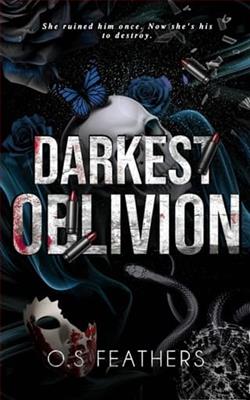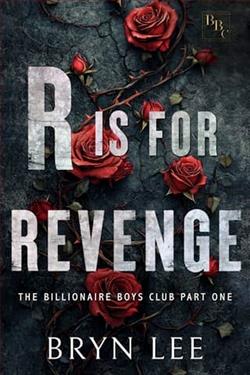Page 3 of Used Bratva Bride
Rehearsing my pitch in my head, I try to muster the confidence I’ll need to present my case. My father, James Spade, values money and success above all else. If I can demonstrate that Crafted Connections is not just a passion project but a viable, profitable venture, perhaps he’ll finally view me as more than just an afterthought in the grand scheme of our family’s legacy.
As I approach the heavy oak door of the study, my rehearsed words mingle with doubt. The echo of my footsteps fills the silent hallway, reminding me how often I’ve walked this path with hopes, only to walk back feeling smaller, diminished by indifference or, worse, outright dismissal.
Just as I raise my hand to knock, I pause. Voices drift through the door—my father’s deep, controlled tone andmy sister Sophia’s sharper, more calculated responses. They’re discussing something intensely, their conversation punctuated by the kind of tension that usually precedes significant family decisions.
“…it’s a precarious situation with Valeri’s death. We need to ensure it doesn’t backfire on us.” Sophia’s voice carries a serious undertone, one that immediately piques my interest.
Valeri Sharov’s death. The name sends a ripple of anxiety through me. The Sharovs have always been enigmatic figures, their dealings shrouded in the kind of secrecy and danger that our family often brushes against in the darker corridors of our business. That Valeri’s death could stir such concern between my father and sister only underscores its potential impact.
“We must tread carefully,” my father advises, his voice a low rumble of authority. “The Sharovs are not to be underestimated, especially not now. Mikhail will be looking to solidify his position.”
Mikhail Sharov. I’ve heard the name whispered at dinners, seen it headlining confidential files left on my father’s desk. A shadowy figure, rumored to be as ruthless as he is charismatic. The thought of his family’s grief and the subsequent shifts in their power structure sends a chill down my spine.
I stand outside the door, my presence unnoticed, my hand still poised to knock but now frozen in hesitation. The gravity of their discussion is far beyond the scope of my small business proposal. How can I interrupt with something as inconsequential as a startup idea when they are strategizing over matters of life and death, alliances and enmities?
My heart sinks as the reality of my situation sets in. In the grand narrative of the Spade family, my ambitions are but a footnote, easily overlooked, quickly forgotten. The folder in my hand feels suddenly foolish, its contents naive.
Should I interrupt? Should I present my business plan amidst discussions of Mafia upheavals and family crises? The doubt gnaws at me, and I find myself stepping back, the weight of my family’s legacy pressing down on me.
As I hesitate, torn between my desire to be seen and the fear of being dismissed, I wonder if there will ever be a right time. Will there ever be a moment when my dreams are given space to breathe, to be considered seriously?
I linger a moment longer, the voices in the study a low hum behind the imposing oak door. The decision to walk away or to knock becomes more than just a choice about timing; it’s a reminder of my constant struggle for recognition within my own family.
Standing there, outside my father’s study, the weight of my family’s legacy and the indifference that often accompanies it settle heavily upon my shoulders.
The faint voices behind the door serve as a stark reminder of where my family’s priorities lie, and they’re not with me or my dreams. The conversation inside grows heated, their words laced with urgency and a tension that speaks to the precarious nature of our family’s position within the dangerous networks we are tied to.
The muffled sound of my father’s stern voice slices through the oak barrier, his advice to Sophia clear and sharp. “Stay cautious,” he warns, “things could get very complicated with the Sharovs now.”
The seriousness of their discussion is palpable, the stakes obviously high. My heart races, not just with nerves about presenting my own idea, but now also with the fear of its inevitable dismissal in the face of such dire family concerns.
I shuffle slightly, my mind racing to find a way to interrupt, to insert my own concerns into the stream of their grave strategizing. How can I speak of Crafted Connections, a project fueled by passion and creativity, when they are entrenched in discussions about survival and power plays?
Just as I muster a flicker of courage, the study door swings open abruptly. My father stands there, his imposing figure filling the doorway, his expression turning from one of focused command to dismissive irritation upon seeing me.
“Julie, what is it?” he asks sharply, his tone implying that whatever I have to say, it couldn’t possibly be of importance.
I open my mouth, words teetering on the tip of my tongue, eager to spill out the rehearsed pitch I had honed to perfection. The chill in his eyes, the sheer disinterest, freezes them in place. The room behind him breathes power and crisis, a stark contrast to the hopeful, small-scale venture I want to discuss.
“There are more important matters to focus on right now. This idea can wait,” he cuts off any attempt I might make to persuade him otherwise. His dismissal is a clear signal that my contributions are neither needed nor wanted, not when there are bigger, more pressing issues at hand.
The sting of rejection is sharp, and I try to find my voice, to push back against the wave of insignificance that threatens to overwhelm me. I want to argue, to make him see the potential in my idea, how it could diversify and strengthen our family’s business portfolio in a new, untapped market. The words stick in my throat, unspoken, as I realize the futility of my efforts.
Sophia, ever the dutiful daughter, doesn’t even glance up from the papers she’s poring over. Her focus remains locked on the immediate threats, the strategies that will protect andadvance our family’s interests in ways that my little project never could.
Heart sinking, I step back, the folder clutched in my hand feeling suddenly very heavy. The gap between my world and theirs, between my dreams and their realities, yawns wider than ever. I turn away, the door closing softly behind me, sealing away the world of power and danger that I have no part in.
As I walk back down the hallway, each step is heavy with a mix of disappointment and resignation. The echo of my footsteps is a lonely sound, a stark reminder of my place in the Spade family hierarchy. My idea, full of potential and passion, retreats into the shadows of my mind, once again overlooked and undervalued.
The walk back to my room feels longer than ever before. The walls, adorned with portraits of Spades who have wielded power and influence, seem to scrutinize me, their gazes piercing and judgmental. I feel small, diminished not just by my father’s dismissal, but by the entire lineage of power that expects so much yet offers so little support for anything outside its direct line of interest.
Once inside the sanctuary of my room, I place the folder on my desk, a tangible representation of my thwarted hopes. It lies there, unopened, as I sink onto my bed, the weight of the day pressing down upon me.
Tears prick my eyes, born of frustration and a deep-seated feeling of invisibility within my own family. I wipe them angrily away, refusing to let them fall. No, I will not cry. Instead, I resolve to find another way, to somehow make Crafted Connections a reality, even if it means doing so without the Spade family’s backing.
Still, I have to try first.
As I sit alone in my room, the earlier encounter with my father replays in my mind, each word sharper and more dismissive in the echo of memory. The frustration boils inside me, a mixture of resentment and the all-too-familiar sting of being overlooked.















